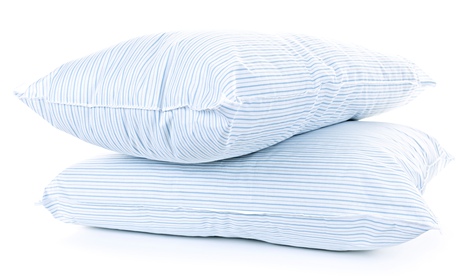I found this to be very informative so I thought I'd share it with you guys:
"Should I throw away my pillows?
Most of us don't know we should replace our pillow occasionally. But what's the danger if you don't?

Pillows … how often should you replace them? Photograph: Alamy
How much thought do you give to the cushion that supports your head and neck? Not a lot, according to a survey from pillow manufacturers Ergoflex. Out of 2,200 men and women, only 18% knew they should replace their pillows every two years. The average person uses the same pillow for three years and two months. John MacEwan, the managing director of Ergoflex, is shocked by this relaxed attitude, proclaiming that we are "risking sustained periods of sleeping without an adequate level of support in the neck and head, along with various hygiene problems that may arise from dust mite infestations in older bedding". So should we be heading off to John Lewis before bedtime or is this merely a marketing ploy?
The solution
There is no good evidence for how long most pillows last. The Sleep to Live Institute in America (which again has industry links) recommends replacing them every six months. Many – though not all – sleep experts say that if you fold your pillow in half and it doesn't spring open straight away by itself then it's dead: it can't support your head and neck, so bin it. Dust mites also like pillows, but although the idea of inhaling their dried excrement mixed with your dead skin may be unappealing, it is only people with allergies or asthma who will suffer the effects.
An allergy study in 2005 from the University of Manchester took samples from 10 pillows with between one and a half and 20 years of regular use and found several thousand spores of fungus per gram of pillow. The study didn't look at the effects of sleeping on fungal spores but aspergillus (a common fungus) is associated with exacerbations of asthma. Then there's research showing how using the wrong pillow can cause neck stiffness, arm pain and headaches in the morning. Pillows should support the cervical spine (the neck bit of the spine) in a neutral position as this reduces more extreme movements in sleep. One study found better sleep in people using latex, polyester or foam contour pillows. Feather pillows were associated with more neck pain.
A study in the Journal of Pain Research looking at side sleepers also found feather pillows were more associated with headache or neck pain on waking – latex pillows were rated the best. Pillows are an individual choice but we should at least think about which type suits us and not be embarrassed about asking to try them in the shop. But a pillow should keep your head aligned with your spine and support your neck. You may want to wash your pillows regularly. You can buy dust mite covers for pillows – but they need washing too – see the manufacturer's instructions, but they usually need very hot water."
If you have any questions or would like to see what options are out there for quality orthopedic pillows, please send me an email to jaxchiro@gmail.com or visit us at Active Medical & Chiropractic to see samples of some of the best I have encountered in my 16 years as a practicing D.C.
As always,
Be Well!

No comments:
Post a Comment